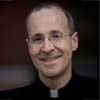 By Rev. James Martin, S.J
By Rev. James Martin, S.J
We live in a church where almost any disagreement to almost any degree with almost any church leader on almost any topic is seen as dissent. And I'm not speaking about the essentials of the faith -- those elements contained in the Creed -- but about less essential topics. Even on those topics -- say, the proper way to deal with politicians at odds with church teaching, new translations of the Mass, the best way for bishops to deal with complicated pastoral issues, and so on -- the slightest whiff of disagreement is confused with disloyalty.
What does this engender? It engenders a fear-based church. It creates clergy and religious frightened of speaking out, terrified of reflecting on complicated questions, and nervous about proposing creative solutions to new problems. It leads to the laity giving up. It causes the diminution of a thoughtful theological community. It muzzles what should be a vibrant, flourishing, provocative, innovative, challenging Catholic press. It empowers minuscule cadres of self-appointed watchdogs whose malign voices are magnified by the blogosphere, and who, with little to no theological background, freely declare any sort of disagreement as tantamount to schism -- and are listened to by those in authority. It creates fear.
Now, does this seem like what Jesus wanted to establish on earth? It doesn't to me. I thought he said, "Fear not!" And I thought St. John said, "There is no fear in love." And "Perfect love casts out fear." But perfect fear casts out love, too.
Bishop Kevin Dowling has said there is a "pressure to conform" and he is correct; it is intense, particularly in official church circles. As we face the effects of the clerical sex-abuse scandals, what we need is not a fear-bred silence, but a hope-filled willingness to listen to all voices, because the Holy Spirit works through all of us.
I've been making my way through Pope Benedict's Jesus of Nazareth, which I'm enjoying very much. At the beginning of his book the pope says something surprising, that the book is "absolutely not" a work of doctrine, but the "expression of my own personal research." "Consequently, everyone is free to contradict me. I only ask the readers that they read with sympathy, without which there will be no comprehension." That seemed eminently sensible, completely humble, and absolutely right. How much easier it is to listen to someone who invites, rather than commands.
And how wonderful if everyone in the church could be afforded that "sympathy." Then we could listen to the voices of all sorts of people who have much to offer the church, by way of their own "expressions" of their "personal research" -- that is, the experience of their lives as faith-filled members of the Body of Christ. The pope's approach in his book -- about Jesus, hardly an insignificant topic! -- is the way to go.
Some reading this will perhaps think that I am a dissenter from church teachings. Quite the opposite: I believe every word of the Creed and I have not dissented from any teaching. But in this climate, with so many new media-encouraged self-appointed guardians ready to pounce on any whiff of disagreement or critique -- to assume the worst, rather than the best -- and twist it into a charge of "disloyalty," I expect my point will be made for me. Optimistically, I can only hope to be surprised.
James Martin, SJ, is culture editor of America magazine and author of The Jesuit Guide to (Almost) Everything. This has been adapted from a post on In All Things.
7/19/2010 4:00:00 AM




